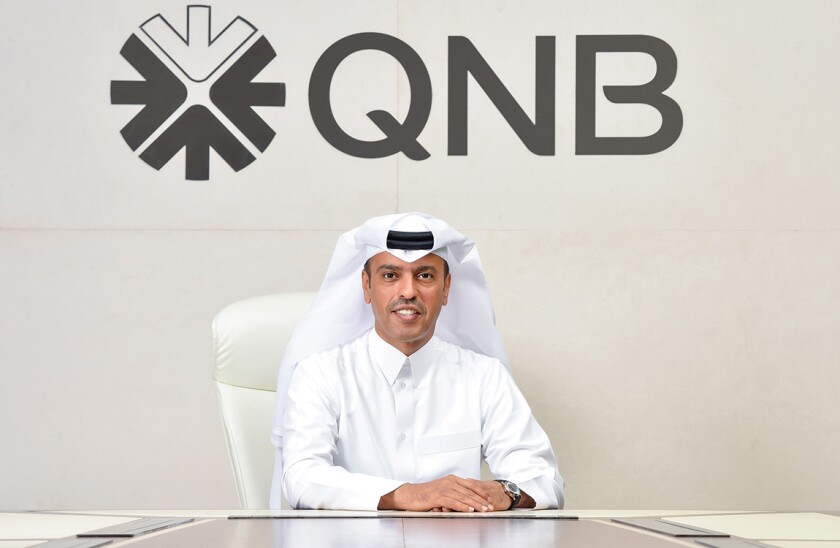A lynchpin of Qatar’s robust economic growth, QNB is playing a pivotal role in supporting major infrastructure projects in the country. But its strength extends across the whole Middle East and beyond.
A network spanning more than two dozen countries on three continents allows the firm to bring its full-service offering to developed and emerging markets alike.
Underpinning QNB’s goal to cement itself as one of the leading banks in the Middle East and Africa (MEA) is a three-pronged approach.
The first component is a strong focus on QNB’s core operation as an international wholesale bank. “This means further uplifting our wholesale capabilities by enhancing our value propositions as a solution-led firm,” says Abdulla Mubarak Al-Khalifa, QNB’s global CEO.
Competition is fierce, but QNB has a winning strategy and stellar profile in its favour. Al-Khalifa points to the firm’s strong credit ratings, brand value and relationships across an international network.
QNB is one of the highest-rated banks in the Middle East and Africa, boasting A+ ratings from Standard & Poor’s and Fitch. Moody’s rates it even higher at Aa3. All three agencies cite QNB’s flagship status, profitability and asset quality.
In 2023, QNB Group posted net profit of $4.3bn, an increase of 8% over the previous year. Operating income was up 11% to $10.7bn. The impressive results ensured QNB remains the largest bank in MEA and ― with a market cap of $42bn ― one of the world’s top 50 banks.
Cost control
A vital factor in the bank’s excellent financials is its strategic focus on cost efficiency. QNB Group has been able to maintain a market-leading cost-to-income ratio of 20%. In addition, its capital adequacy ratio remains comfortably high at 19.8%, well above both the Qatar Central Bank and Basel III requirements.
“We continue to grow our brand value that currently stands at $8.4bn and have maintained our status as MEA’s most valuable banking brand,” says Al-Khalifa. “With a network that spans 28 countries in Asia, Africa and Europe, we are able to leverage our relationships as a full-service financial institution across a range of hard-to-access frontier and emerging markets.”
An international market offering huge growth potential for the bank is the Kingdom of Saudi Arabia. QNB also sees significant opportunity for growth in its international branches in London, Paris, Singapore and Hong Kong. “These financial centres allow us to capture market share for trade and investment flows with global and multinational corporate customers, to fuel our growth,” says Al-Khalifa.
In its home market, QNB is helping drive the engine of economic growth. The multi-billion dollar North Field natural gas expansion project is a major opportunity for QNB to support Qatar’s development in the coming years.
“We are actively supporting initiatives across the value chain, ranging from wells, pipelines, LNG storage tanks, new LNG tankers, all the way through to the expansion of Qatar’s refining and downstream capacity,” says Al-Khalifa.
Embracing new technology
The second element of QNB’s overarching strategy is leveraging innovation as a strategic enabler capitalising on developments such as open banking, platforms, data and analytics, artificial intelligence, digitisation and automation.
Changes in regulatory landscape, customer behaviour and the entry of new FinTech competitors are increasingly challenging the ways of operating in the traditional banking sector. This brings technological disruption, financial disintermediation but also opportunities for banks like QNB at the cutting edge of digital development.
The bank is exploring FinTech opportunities across a range of business segments from payments and digital wallets to solutions that provide further automation, integrate AI and leverage machine learning.

“Our QNB digital 3.0 programme focuses on investing in our IT capabilities to enable digitisation through the adoption of new technologies, and uplifting of our IT architecture and infrastructure,” says Al-Khalifa. “This improves efficiency and accelerates decision-making in a more customer-centric manner across our processes end-to-end.”
The last but by no means least element of QNB’s strategy is embedding sustainability across its business and operating model to deliver positive impact across ESG-related topics.
Banks play an important role in contributing to financial stability and economic growth. As the largest financial institution in MEA, QNB recognises the positive influence its operations can have on the environment, society and governance.
“As a bank, the most impactful way to address the topic of sustainability is through our financing activities, which are supported by our Sustainable Finance and Product Framework, which offers over 30 sustainable products across all our businesses,” says Al-Khalifa. “Ensuring ESG is prioritised across our operations strengthens our governance while reducing environmental and social risks, all with the intent to make a positive contribution to our society and the environment.”
KEY COMPANY DATA
First half of 2024
Total assets: $346bn
Net profit: $2.2bn
Capital adequacy ratio: 19.2%
Loan to deposit ratio: 98.7%
